The Hindu Editorial (Revision sans vision) – Dec 18, 2023
To read this article, click “The Hindu”.
This preview is provided here with permission.
Courtesy: The Hindu
The Hindu Editorial (Revision sans vision) – Dec 18, 2023:
- sans (preposition) – without.
- vision (noun) – creativity, perception, foresight, insight, discernment, far-sightedness.
- Bill (noun) – A Bill is a draft statute that becomes law after it is passed by both the Houses of Parliament and assented to by the President. All legislative proposals are brought before Parliament in the forms of Bills (or) draft statute/law, proposed legislation, proposal (presented to parliament/congress/council for discussion).
- body (noun) – a large amount of something; a collection of something.
- criminal Law (noun) – a complex system of laws concerned with punishment of individuals who commit crimes.
- a body of law (noun phrase) – system of rules; regulations, fundamental principles, charter, constitution.
- feature (noun) – quality, aspect, point, factor, element, ingredient.
- path-breaking (adjective) – pioneering; innovative.
- in the absence of (phrase) – as someone or something is not available/present.
- reflect (verb) – indicate, show, display, demonstrate, represent, exhibit.
- the legislature (noun) – a deliberative body of persons, usually elective, who are empowered to make, change, or repeal the laws of a country or state. India follows a bicameral (two chambers/parts) system at both the centre and state level.
- legislature (noun) – law-making body or governing body; parliament, congress, council, assembly.
- Bharatiya Nyaya Sanhita (BNS) Bill 2023 (noun) – It is introduced to replace the Indian Penal Code (IPC).
- Bharatiya Nagarik Suraksha Sanhita (BNSS) Bill 2023 (noun) – It is introduced to replace the Code of Criminal Procedure (CrPC).
- Bharatiya Sakshya Bill 2023 (noun) – It is proposed to replace the Indian Evidence Act (IEA).
- Sanhita/Code (noun) – a set of rules.
- scrutiny (noun) – examination, inspection, investigation.
- House committees/Parliamentary committees (noun) – The parliamentary (standing & select) committees; They do close examination and investigation of government policies, actions and spending.
- Parliamentary Standing Committee/Parliamentary panel (noun) – it is a committee (consisting of Members of Parliament) constituted usually on an annual basis to enable detailed consideration/discussion on all bills (all proposed laws).
- Parliamentary select committee (noun) – ‘parliamentary select committee’ can be formed for a specific purpose, for instance, to deliberate on a particular bill. Once the Bill is disposed of, that select committee ceases to exist.
- legislative (adjective) – law-making, parliamentary, policy-making, administrative.
- deliberation (noun) – dialogue, discussion, discourse, debate, negotiation, talks.
- chamber (noun) – one of the houses of a parliament or congress or legislative assembly.
- given (preposition) – considering, taking into account, bearing in mind.
- implications (noun) – consequence/outcome, ramification, repercussion.
- give rise to (phrase) – cause, bring about, result in, lead to, produce, generate.
- as a result (phrase) – because of, on account of, owing to, due to.
- conspicuous (adjective) – clearly visible, noticeable; obvious, evident, apparent, flagrant, blatant
- outbound (adjective) – travelling/going out of your home country.
- barring (preposition) – except, except for, apart from, other than, besides, excluding.
- language (noun) – wording, phrasing, expressions, vocabulary, parlance.
- claim (noun) – assertion, contention, statement, affirmation.
- imprint (noun) – (lasting) impact, effect, influence, impression.
- Indian Penal Code (IPC) (noun) – The Indian Penal Code (IPC) is the official criminal code of India. It is a comprehensive code intended to cover all substantive aspects of criminal law. The draft was passed into law on 6 October 1860. The Code came into operation on 1 January 1862. The Indian Penal Code of 1860, sub-divided into 23 chapters, comprises 511 sections. IPC deals with crimes and punishments.
- Code of Criminal Procedure (CrPC) (noun) – The Code of Criminal Procedure (in India). The main legislation on procedure for administration of substantive criminal law in India. It was enacted in 1973 and came into force on 1 April 1974. CrPC tells about the criminal trial procedure. (The criminal procedure law was re-enacted in 1973, and it is known as the CrPC, 1973, as distinct from its 1898 version).
- Indian Evidence Act (IEA) (noun) – The Indian Evidence Act passed in India by the Imperial Legislative Council in 1872. It contains a set of rules and allied issues governing admissibility of evidence in the Indian courts of law.
- framework (noun) – structure, scheme/system, organisation.
- envisage (verb) – conceive, imagine, envision, think, perceive, apprehend.
- police (verb) – maintain law and order in, patrol; oversee, supervise, watch.
- protracted (adjective) – lengthy, extended, continuing, unending, unrelenting, long-drawn-out, prolonged, persisting, lingering.
- trial (noun) – legal proceedings, inquiry, hearing, legal action/case.
- improvement (noun) – upgrade, refinement, enhancement, furtherance, correction, rectification, development.
- outdated (adjective) – ancient, old, obsolete, out of date, outmoded, archaic.
- sedition (noun) – incitement (to riot/rebellion), agitation, trouble making/provocation (against the established government/authority). Section 124A of the IPC, which describes sedition, seeks to punish speech or writing that brings or tries to bring into hatred or contempt, or excites or tries to excite disaffection towards, the government established by law.
- excite (verb) – cause, bring about, arouse, provoke, incite.
- disaffection (noun) – dissatisfaction, discontent, disgruntlement, hostility, frustration.
- bring in (phrasal verb) – introduce, start to involve (in a particular activity); to introduce something new (such as a law).
- hatred (noun) – enmity, antipathy, antagonism, hostility, resentment, aversion.
- contempt (noun) – disrespect, defiance, disregard, disdain, mockery, animosity.
- offence (noun) – crime, illegal/unlawful act, breach/violation of the law, wrongdoing, act of misconduct, misdeed.
- mob (noun) – a large, disorganized, and often violent crowd of people.
- lynching (noun) – an act of punishing/killing someone by hanging for claimed offence by the group of people without legal trail.
- hate crime (noun) – any criminal offence that is carried out because of hostility or prejudice based on disability, race, religion, transgender identity or sexual orientation.
- grievous (adjective) – painful, severe, serious, shocking, dreadful.
- ground (noun) – reason, basis, cause, rationale, motive.
- panel (noun) – committee, council, commission, advisory body.
- adultery (noun) – voluntary sexual acts between a married person and someone who is not a spouse of that person.
- strike down (phrasal verb) – abolish, annul, nullify (a law or regulation).
- gender-neutral (adjective) – applicable to both genders (male and female).
- penal (adverb) – punishable by law; corrective, disciplinary.
- penal law (noun) – law that is relating to, or involving punishment, as for crimes or offenses.
- legislation (noun) – law, decree, statute, rule, ordinance, act.
- grave (adjective) – crucial/critical, important/significant, serious.
- charge (noun) – accusation, allegation, indictment.
- lightly (adverb) – mildly, carelessly, leniently, thoughtlessly, heedlessly, sparingly
- invoke (verb) – cite, mention, refer to, point to, adduce, turn to, resort to.
- procedural (adjective) – official, formal, systematic, methodical.
- welcome (adjective) – pleasing, agreeable, favourable, promising, much needed.
- provision (noun) – clause, condition, stipulation, requirement, term.
- first information report (FIR) (noun) – a written document prepared by the police when they receive information about the commission of a cognizable offence.
- irrespective of (adjective) – regardless, disregarding, notwithstanding, without consideration of.
- take place (phrase) – happen, occur, transpire.
- sought past tense of seek (verb) – aim, attempt, try.
- forensics (noun) – the application of scientific knowledge & methods to legal problems and legal proceeding.
- seizure (noun) – capture, occupation, takeover, overrunning, annexation, invasion, appropriation.
- lie in (phrasal verb) – to exist consist, be present, be contained
- custody (noun) – imprisonment, confinement, internment, detention, captivity.
- address (verb) – tackle, deal with, attend to, try to sort out.
- inadequacy (noun) – fault, flaw, defect; deficiency, shortage, insufficiency.
Note :
1. Click each one of the words above for their definition, more synonyms, pronunciation, example sentences, phrases, derivatives, origin and etc. from http://www.oxforddictionaries.com/.
2. Definitions (elementary level) & Synonyms provided for the words above are my personal work and not that of Oxford University Press. Tentative definitions/meanings are provided for study purposes only and they may vary in a different context.
3. This word list is for personal use only. Reproduction in any format and/or Commercial use of it is/are strictly prohibited.
The Hindu Editorial (Revision sans vision) – Dec 22, 2023:
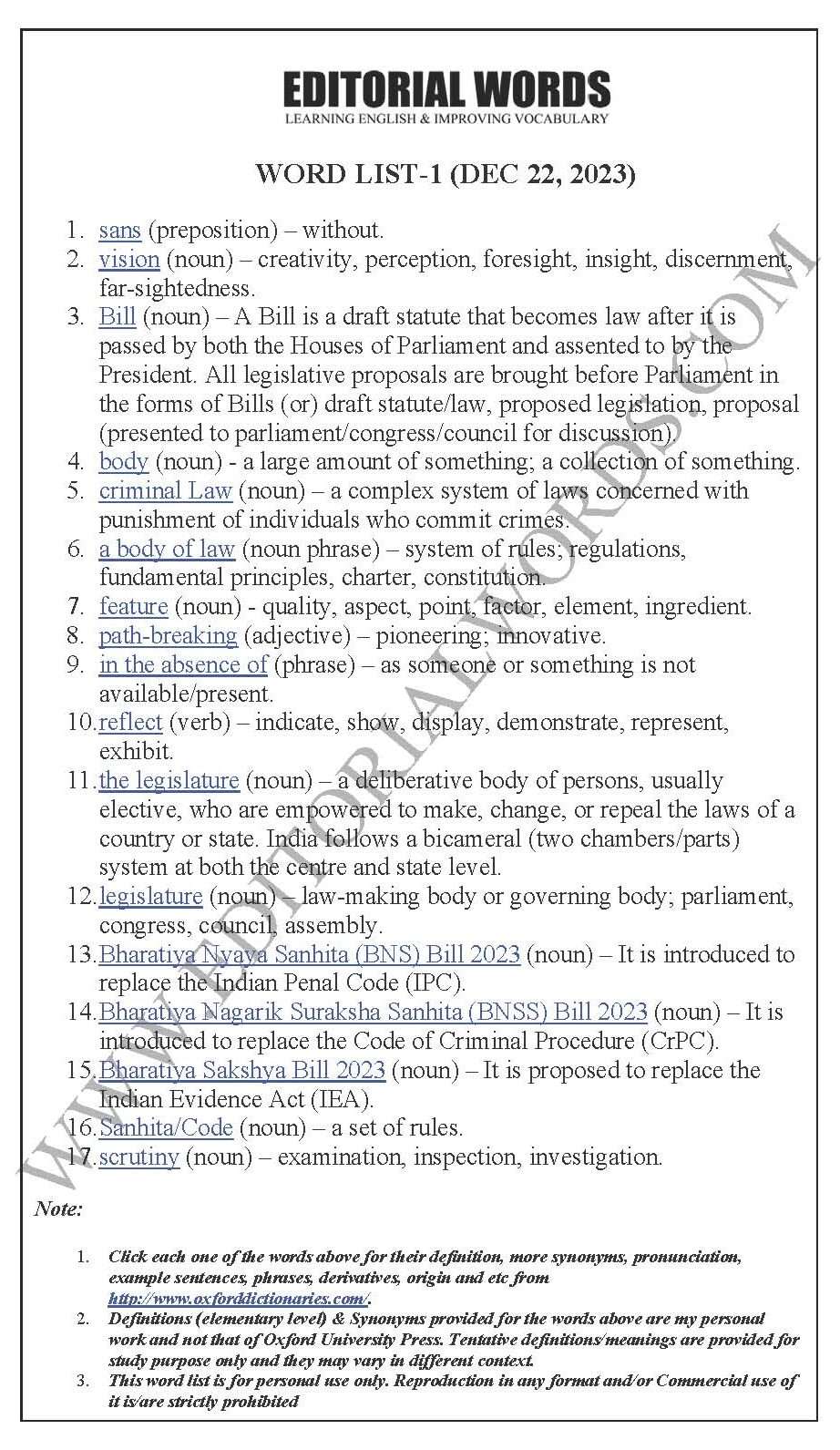
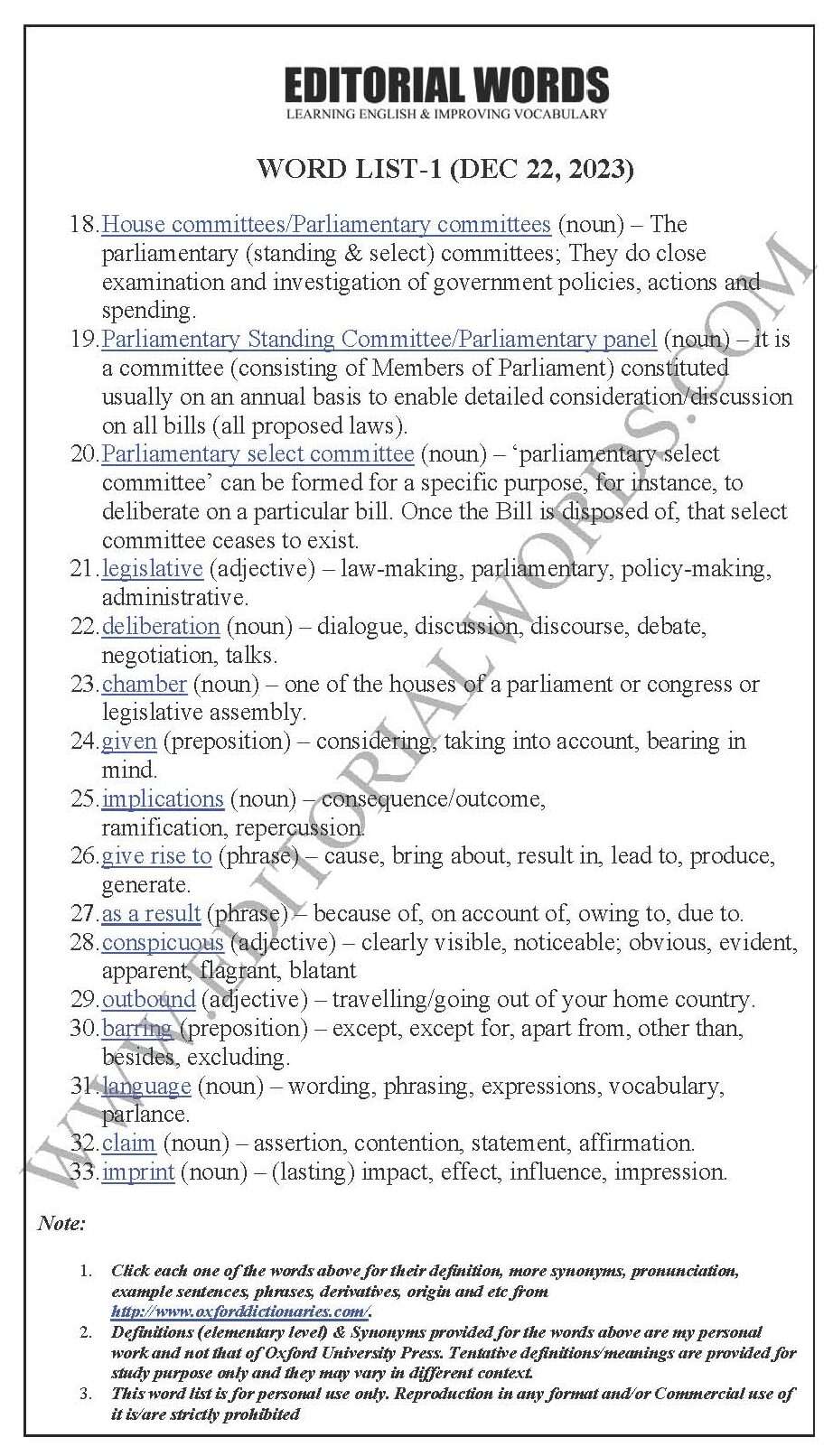
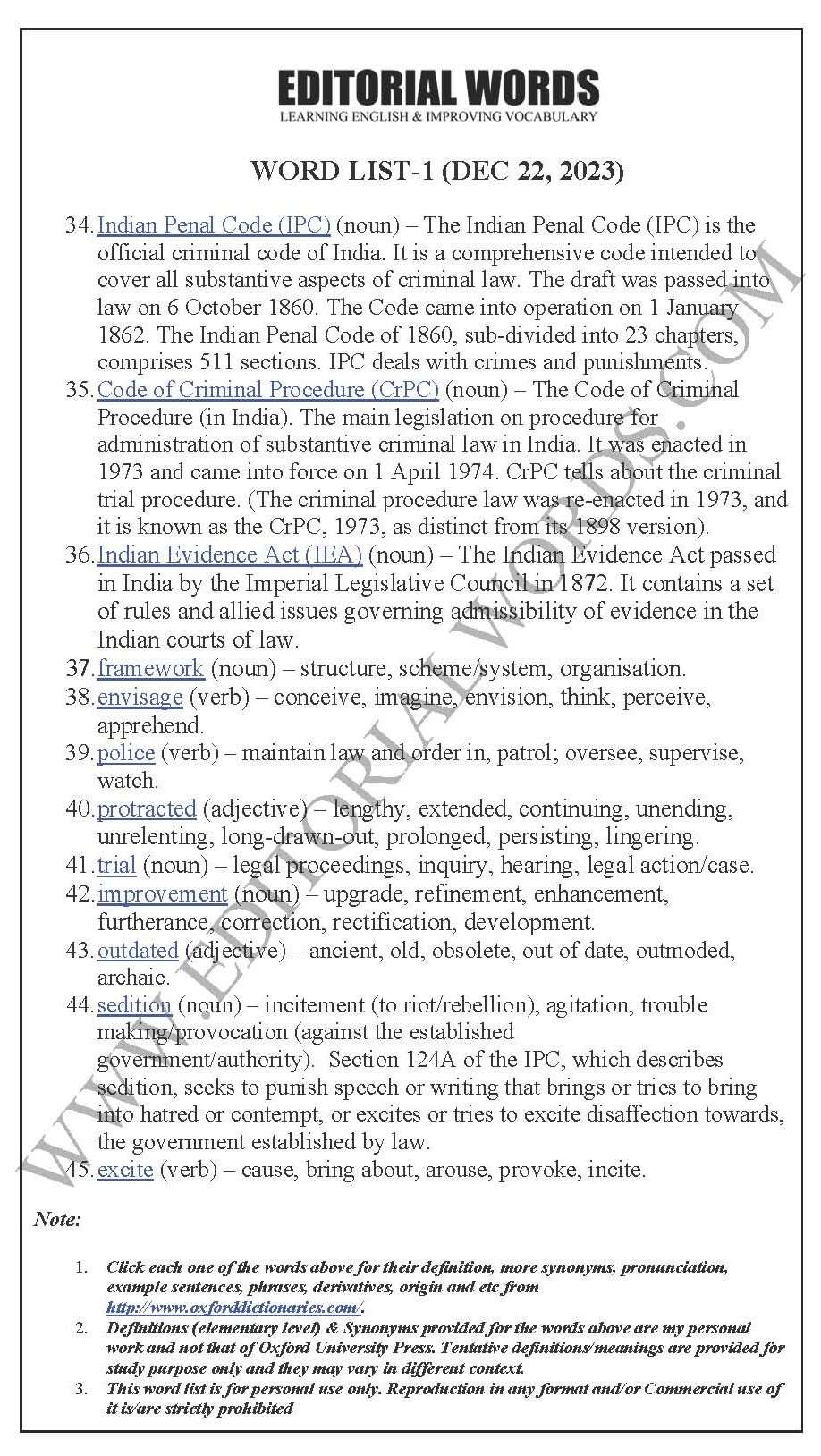
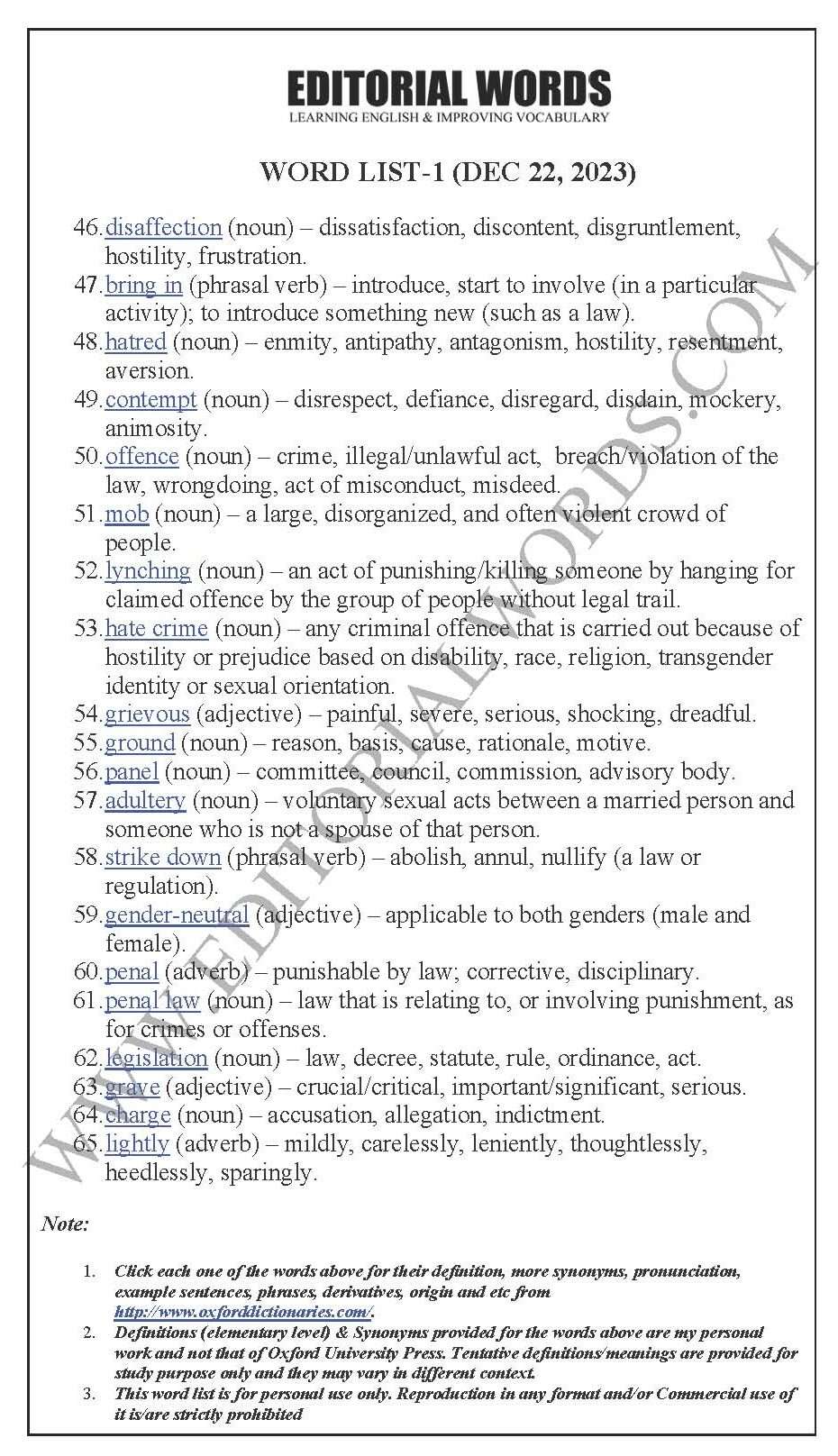
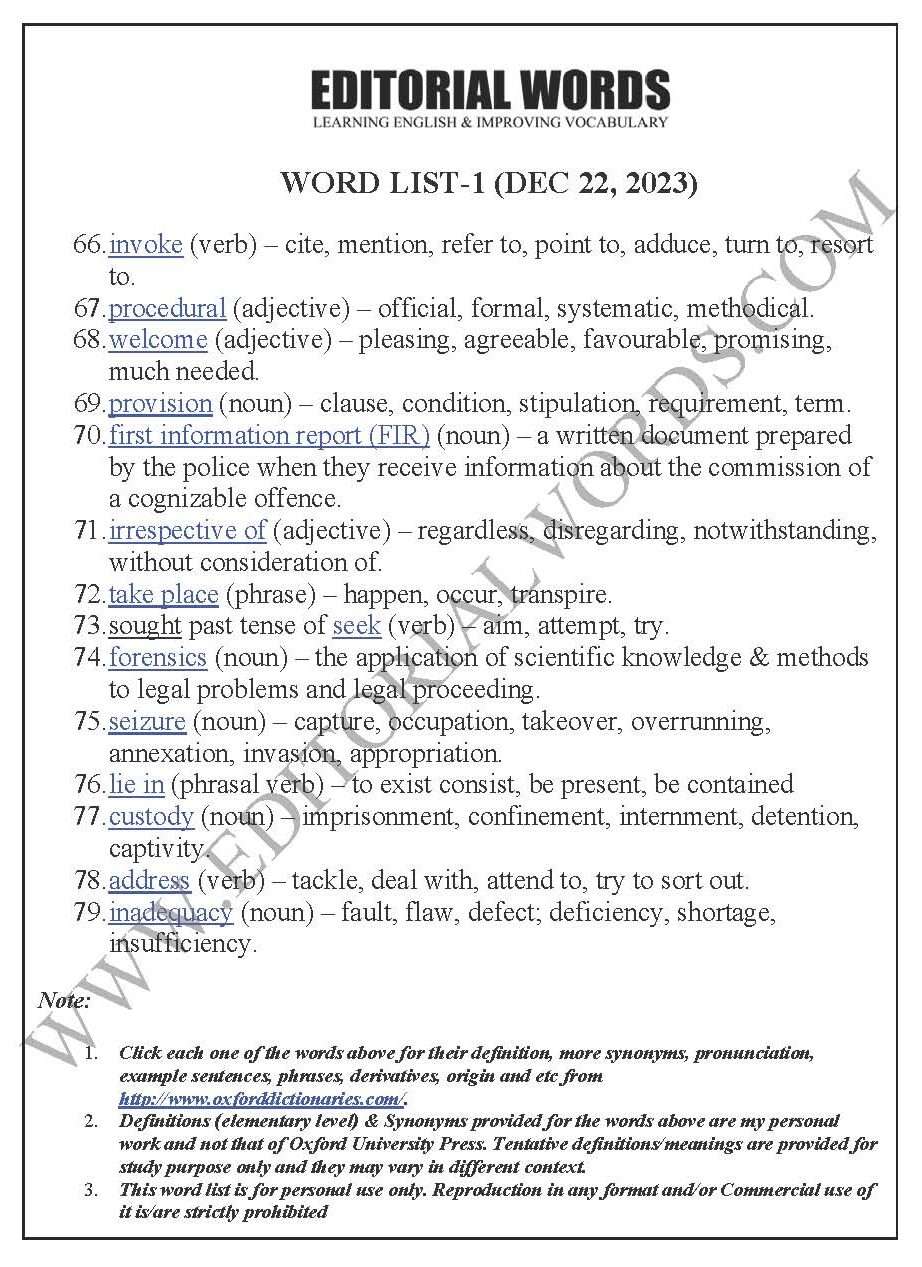
“Phrasal Verbs” We Learnt Last Week
“Idioms & Phrases” We Learnt Last Week
“Important Definitions” We Learnt Last Week
Recent Word Lists For The Hindu Editorial Articles

Law-making in the absence of a significant number of Opposition members does not reflect well on the legislature. The three Bills that replace the body of criminal laws in India were passed by Parliament in its ongoing session in the absence of more than 140 members… For further reading, visit “The Hindu”. Below is today’s word list-1 for The Hindu Editorial (Revision sans vision) – Dec 18, 2023.